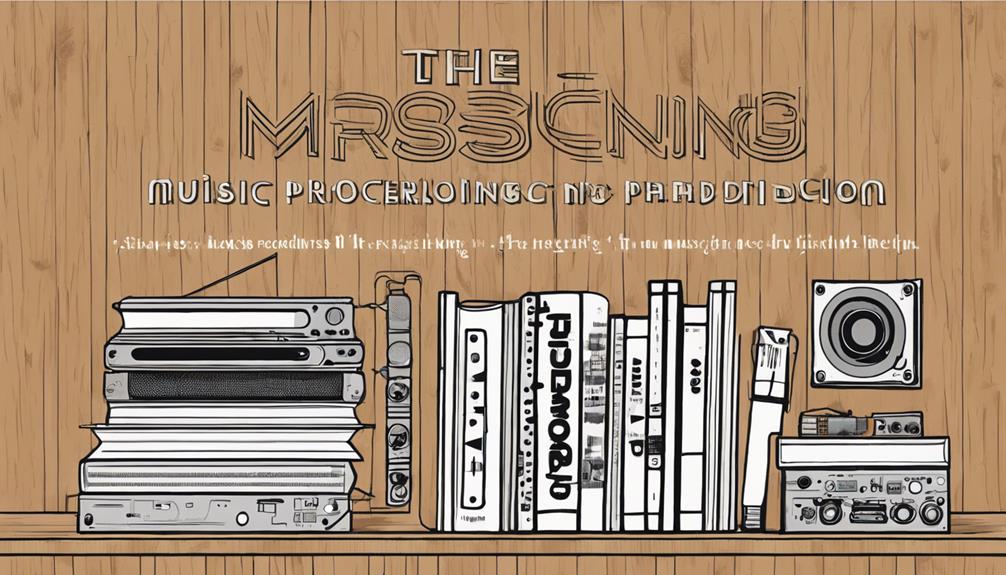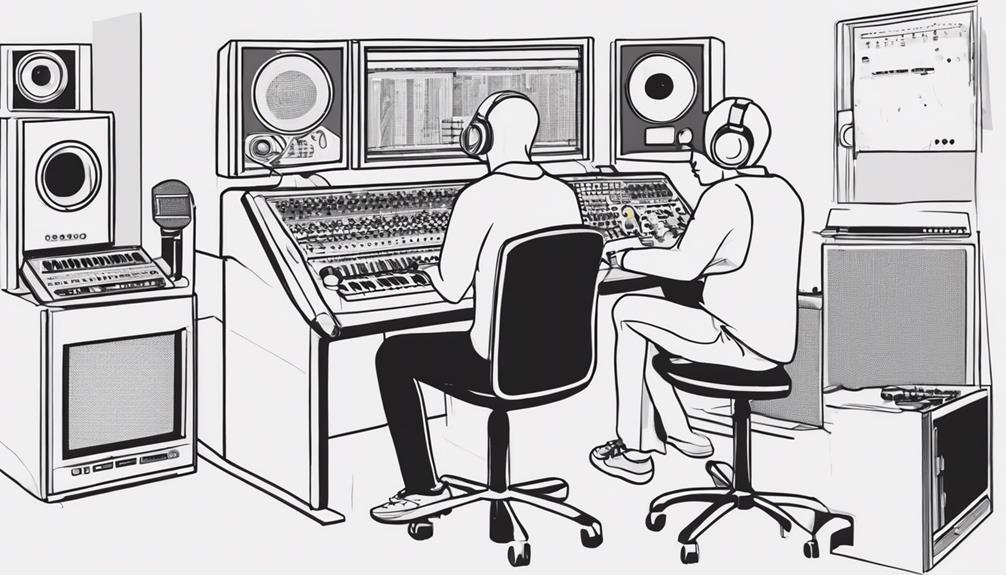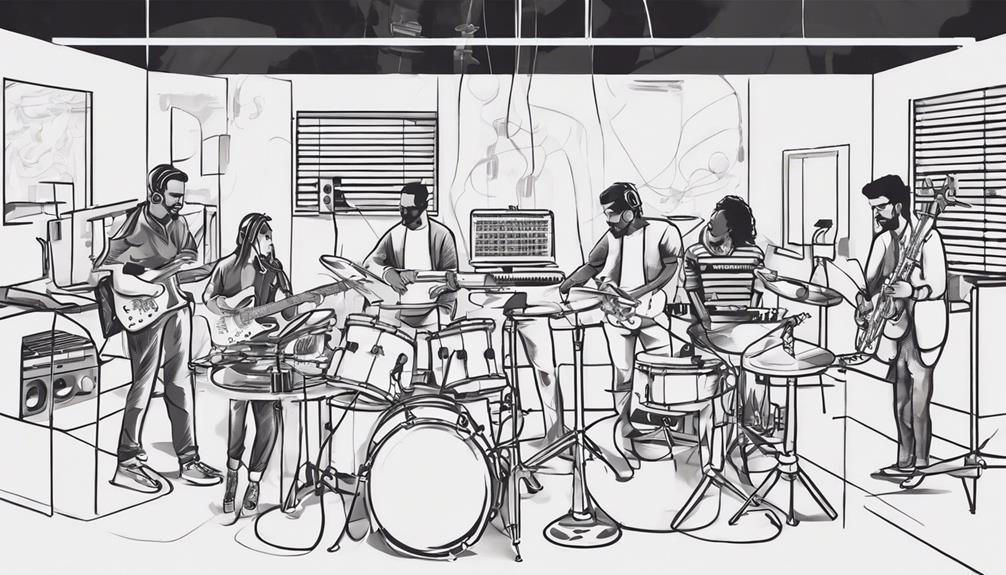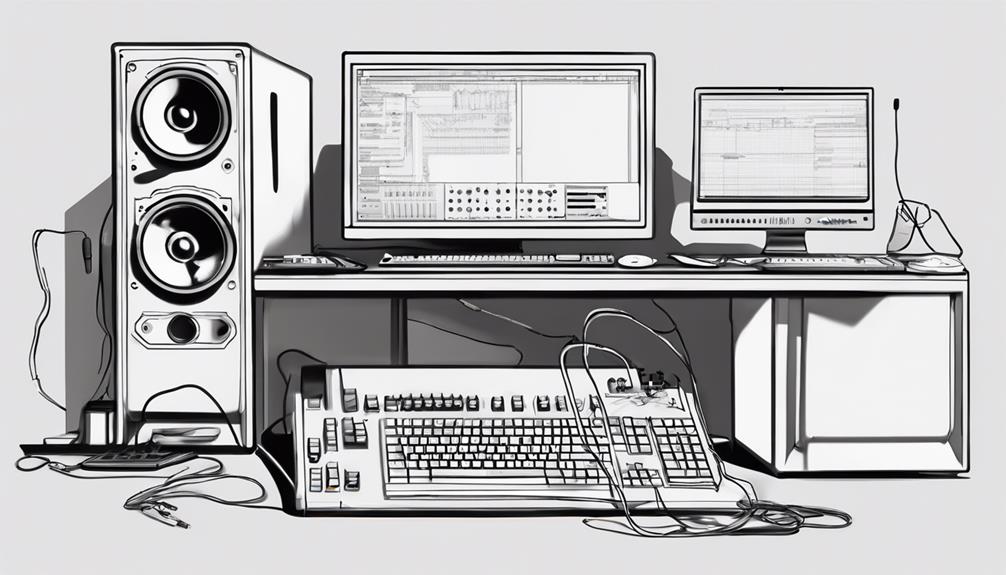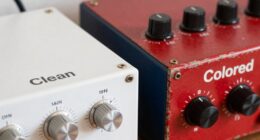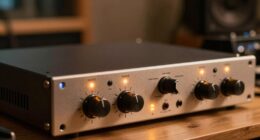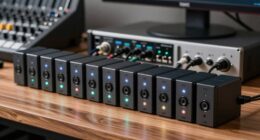When selecting music production books, focus on fundamental theory with 'How Music Works' and 'Music Theory for Computer Musicians.' Explore electronic music production in 'Dance Music Manual' and creativity in 'Making Music.' Enhance habits with 'Music Habits.' Master advanced mixing concepts and automation techniques. Optimize workflow with 'Ableton Workflow Bible' for efficiency and consistency. Understand gear selection, DAWs, and plugins for quality sound. For more top picks on composition, mastering, and marketing, discover the best resources to elevate your music production skills.
Key Takeaways
- Delve into foundational music theory with books like 'How Music Works' by David Byrne.
- Explore basic music theory with 'Music Theory for Computer Musicians' by Michael Hewitt.
- Master EQ and compression techniques with specialized books for professional sound quality.
- Optimize workflow with books like the 'Ableton Workflow Bible' for efficient production processes.
- Consider gear selection and DAW compatibility for informed equipment decisions.
Foundational Music Theory and Production
Delve into foundational music theory and production through books that provide insights into the creative process and structure of music.
Explore basic music theory with books like 'How Music Works' by David Byrne, which offers a deep understanding of the creative process behind music composition.
Additionally, 'Music Theory for Computer Musicians' by Michael Hewitt presents a practical approach to learning music theory within the context of music production, making it easier to apply theoretical knowledge to your production workflow.
When it comes to music production techniques, 'Dance Music Manual' by Rick Snoman is a valuable resource focusing on electronic music production methods and industry standards.
For those looking to gain insight into the creative process of music production and composition, 'Making Music' by Dennis DeSantis is an excellent choice.
Lastly, 'Music Habits' by Jason Timothy provides helpful tips and strategies for developing effective habits in music production, helping you streamline your workflow and boost productivity.
Advanced Mixing Concepts and Techniques
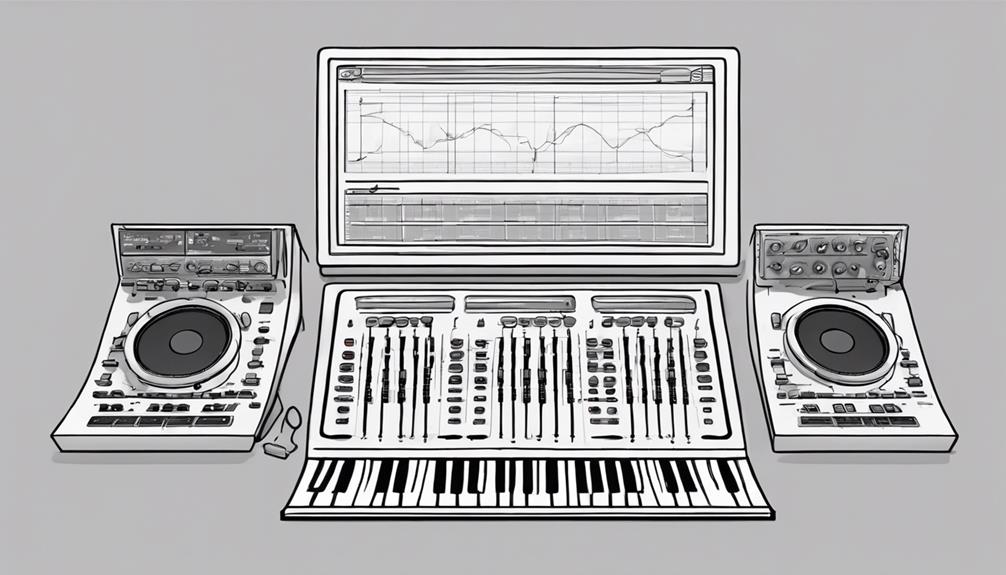
You're about to explore mastering EQ and compression techniques, understanding spatial effects, and utilizing automation techniques in your mixes.
These advanced concepts will help you achieve greater depth, clarity, and balance in your music productions.
Get ready to take your mixing skills to the next level with these essential techniques.
Mastering EQ and Compression
Fine-tuning the tonal balance and dynamic range of a mix is essential for achieving professional sound quality in music production through mastering EQ and compression.
When delving into the mixing process, understanding advanced concepts like EQ matching, multi-band compression, and dynamic EQ can greatly enhance your sound design capabilities.
Implementing parallel compression techniques during mastering is a powerful tool to maintain clarity and impact while effectively managing dynamics.
Linear phase EQs play an important role in mastering by allowing precise frequency adjustments without introducing unwanted phase shifts or artifacts.
Additionally, incorporating advanced techniques such as mid-side EQ processing and dynamic range expansion can significantly enhance the depth and width of your mix during the mastering stage.
Mastering EQ and compression are key components in the music production process that can elevate your tracks to a professional level of quality.
Understanding Spatial Effects
To enhance the immersive quality of your audio mix, mastering the use of spatial effects is essential in creating depth and dimensionality within your music production.
Spatial effects, such as reverb, delay, and panning, play a significant role in placing instruments within a three-dimensional sound field, providing a more engaging listening experience.
Techniques like convolution reverb, stereo imaging, and binaural processing take spatial effects to the next level by replicating realistic room acoustics and positioning sounds precisely in the mix.
Understanding spatial effects enables you to manipulate the perception of distance, movement, and space in your music production, resulting in a dynamic and enthralling sound.
By experimenting with spatial effects, you can add depth, clarity, and realism to your music productions, elevating the overall quality and impact of your final mix.
Embrace the power of spatial effects to transform your mixes into immersive sonic journeys.
Utilizing Automation Techniques
Mastering automation techniques in music production allows for precise control over parameters like volume, panning, and effects to dynamically enhance the overall sound and impact of your mix. Advanced mixing concepts utilize automation to create dynamic changes that bring your music to life. By applying automation to individual tracks, groups, or master channels, you can fine-tune your mix and add creative effects that captivate listeners.
Techniques such as automating EQ, reverb send levels, and filter sweeps inject movement and interest into your mix, making it more engaging and professional-sounding. Understanding automation tools and workflows is essential for mastering advanced mixing techniques and achieving high-quality productions. Explore automation techniques to harness the full potential of your music and elevate your mixes to a professional level.
Experiment with different automation strategies to craft dynamic and compelling soundscapes that leave a lasting impression on your audience.
Workflow Optimization Strategies

Enhance your music production efficiency by implementing practical workflow optimization strategies found in specialized books like the 'Ableton Workflow Bible' and '74 Creative Strategies for Electronic Music Production'. These resources offer valuable insights into streamlining your music production process, allowing you to work more effectively and creatively.
By understanding and applying workflow optimization strategies, you can enhance your overall productivity and consistency in music creation.
Optimizing your workflow involves structuring your production process in a way that minimizes time wastage and maximizes creative output. Books like 'Zen In The Art of Mixing' explore the conceptual aspects of mixing, providing a deeper understanding of how mindset and creative approaches can greatly impact your workflow.
Consistent implementation of workflow optimization strategies is essential for maintaining a productive and creative environment in your music production projects.
Technical Tool-Oriented Approach
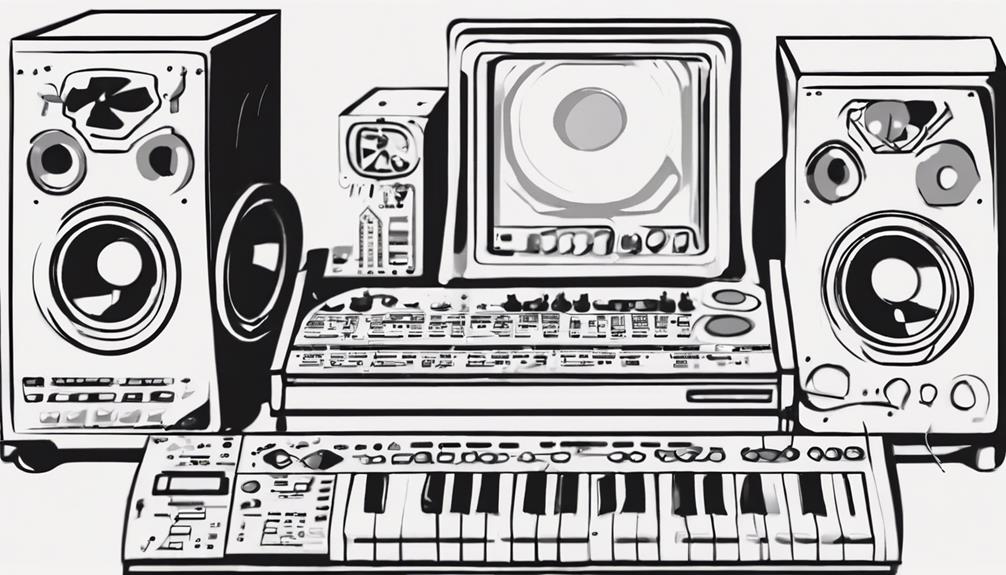
When looking for music production books with a technical tool-oriented approach, focus on essential gear selection and compare different production software options.
These points will help you understand the tools needed for music production and how to effectively use them in your work.
Make sure to choose resources that provide practical guidance on selecting gear and optimizing production software for your specific needs.
Essential Gear Selection
Consider exploring books that investigate the technical tools essential for music production gear selection to enhance your knowledge in this area. For aspiring music producers, understanding gear selection is vital for achieving professional sound quality.
Look for resources that delve into Digital Audio Workstations (DAWs), plugins, and hardware, providing insights into the best tools for recording, mixing, and mastering. Books that discuss gear selection criteria tailored to specific music genres can offer specialized guidance for your production needs.
Additionally, grasping the significance of gear compatibility and integration is key to making informed decisions when choosing equipment. Seek out books that offer practical tips on setting up and optimizing your music production gear to streamline your workflow and boost productivity.
Production Software Comparison
To effectively choose the best production software for your music projects, start by comparing key features, compatibility, and user interfaces to align with your preferred workflow methods. Consider platform limitations, system requirements, and software updates for long-term usage. Evaluate customer support, online communities, and tutorials for additional learning resources. Trial versions, demo projects, and reviews can help in making an informed decision. Research forums, social media groups, and industry professionals for real-world experiences and recommendations.
| Feature | Compatibility | User Interface |
|---|---|---|
| Advanced FX | Mac, Windows | Intuitive |
| MIDI Support | iOS, Android | Customizable |
| Virtual Instruments | Linux, Mac | Streamlined |
| Multi-track recording | Windows | Modern |
| Audio Editing | Mac | User-friendly |
Creative Mindset-Focused Perspective
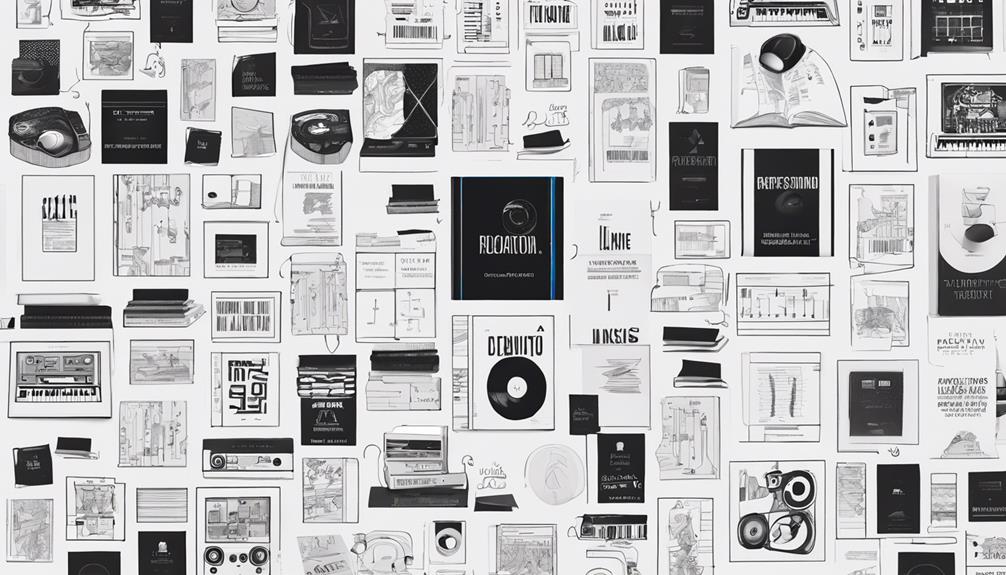
With a creative mindset-focused perspective, 'Zen In The Art of Mixing' offers insights into the artistic and intuitive aspects of music mixing. Here's why this book stands out in guiding you through the mixing process:
- Essential Approach: The book emphasizes the subjective nature of mixing, highlighting how personal preferences and creativity play an essential role in achieving a unique mix.
- Artistic Exploration: It explores the artistic side of mixing, encouraging you to investigate different techniques and develop your own style.
- Experimental Mindset: 'Zen In The Art of Mixing' promotes experimentation, helping you break free from conventional mixing methods and think outside the box.
- Mindset Importance: By focusing on the mental aspects of mixing, the book underscores the significance of mindset and attitude in creating a cohesive and expressive mix.
Through its focus on creativity and intuition, this book can help you approach mixing from a fresh perspective and elevate your mixing skills to new heights.
Composition and Production Techniques
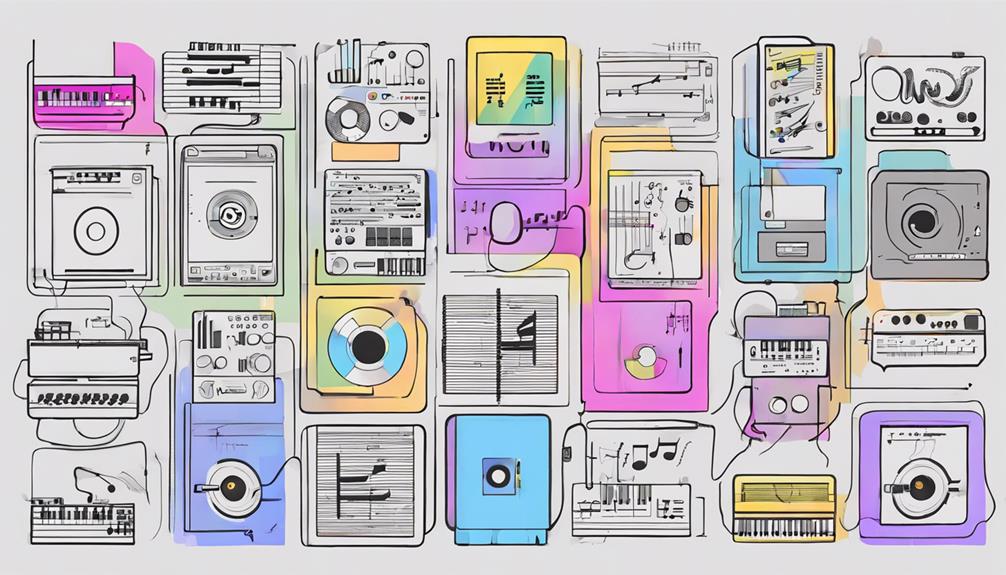
Understanding composition techniques is essential for creating engaging and memorable music. When delving into the production process, mastering composition techniques becomes pivotal.
Books that cover composition and production techniques offer valuable insights into the technical aspects of recording, editing, and mixing music. By learning about chord progressions, song structure, and arrangement, you can greatly enhance the quality of your music production.
These resources provide practical tips and strategies that can elevate your music to new heights. Additionally, experimenting with different production techniques can lead to the creation of unique and innovative sounds.
Mastering Essentials
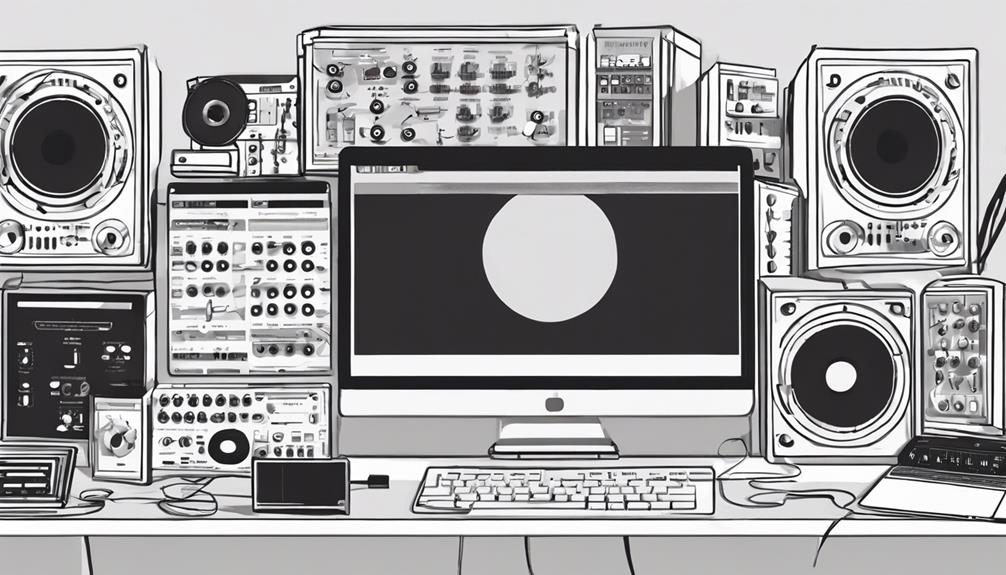
Mastering serves as an essential final touch in music production, enhancing the overall sound quality of a track to achieve a polished and professional result.
To explore further into mastering essentials, consider the following points:
- Educational Resources: Books like 'Mastering Audio: The Art and the Science' by Bob Katz provide valuable insights into the art and technical aspects of mastering.
- Providing Quality Stems: Offering high-quality stems to mastering engineers is vital for ensuring a professional and polished final product.
- Staying Updated: Keeping abreast of current mastering techniques and technologies is crucial to uphold high production standards in music.
- Consistency and Balance: Mastering plays a pivotal role in maintaining consistency, balance, and ideal playback across various audio systems and platforms.
Marketing Strategies for Musicians
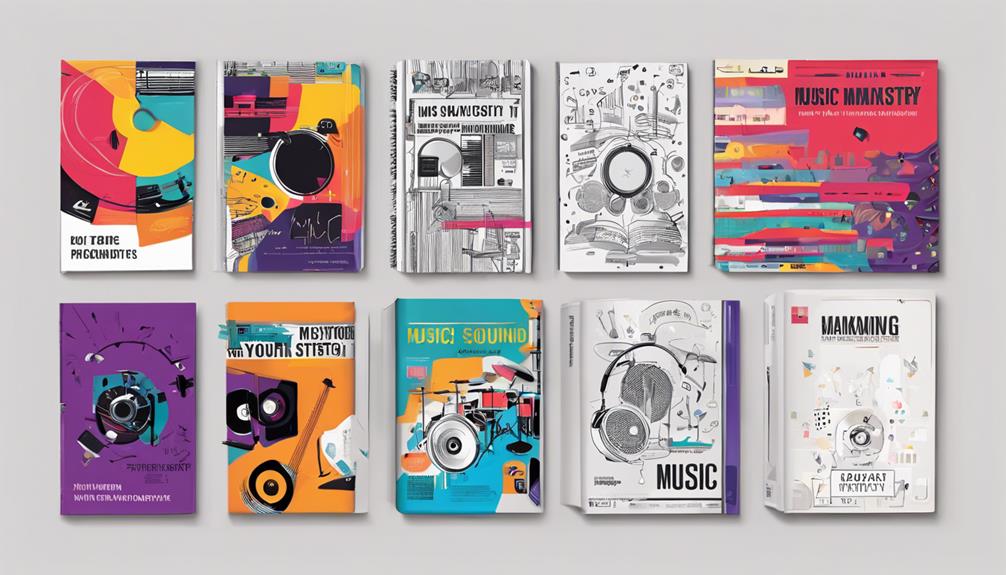
Exploring effective marketing strategies is essential for musicians aiming to promote their music and cultivate a strong fan base in the competitive music industry. To help you navigate the world of music marketing, consider the following strategies:
| Direct Connections | Outsourcing Marketing |
|---|---|
| Engage with listeners through social media and live events. | Consider hiring professionals to handle marketing campaigns. |
| Utilize email newsletters to keep fans updated on new releases and events. | Collaborate with influencers to reach a wider audience. |
Books like 'Music 4.1: A Survival Guide for Making Music in the Internet Age' and 'How Music Got Free' explore modern music marketing strategies, offering valuable insights into promoting your music effectively in today's digital landscape. By understanding the importance of marketing and implementing these strategies, you can enhance your visibility in the music industry and connect with a broader audience.
Frequently Asked Questions
How Do I Find the Best Music Producer?
When seeking the best music producer, consider their diverse portfolio, experience with various artists, and recommendations. Research their technical skills and equipment. Schedule consultations to discuss goals and confirm compatibility with your music vision.
What Is the Best Music Production Course?
When selecting the best music production course, consider your goals, look for hands-on experience, check the reputation of the provider, read reviews, and review the curriculum. Verify it aligns with your skill level and interests. Additionally, ensure that the course provides opportunities to network with industry professionals and fellow aspiring producers, as these connections can be invaluable. Some programs also offer expert tips for music production that can help you refine your skills and gain insights into advanced techniques. Taking the time to research thoroughly will increase your chances of finding a course that truly supports your journey in music production.
How Do You Become a Top Music Producer?
To become a top music producer, you need dedication and passion. Experiment, network, practice, and stay updated on trends. Embrace technology, learn the business side, and collaborate. Remember: "Practice makes perfect." Success awaits your hard work.
How to Produce Music for Beginners?
To produce music as a beginner, start by learning foundational concepts with books like 'How Music Works' by David Byrne and 'Music Theory for Computer Musicians' by Michael Hewitt. Practice and apply knowledge for growth.
Conclusion
So, as you conclude your exploration of the best music production books, remember to ponder your goals and interests.
Are you aiming to master the technical side of production or ignite your creativity with new techniques?
With so many options out there, don't settle for just any book – find the one that resonates with you and your unique musical journey.
Are you ready to take your music production skills to the next level?

